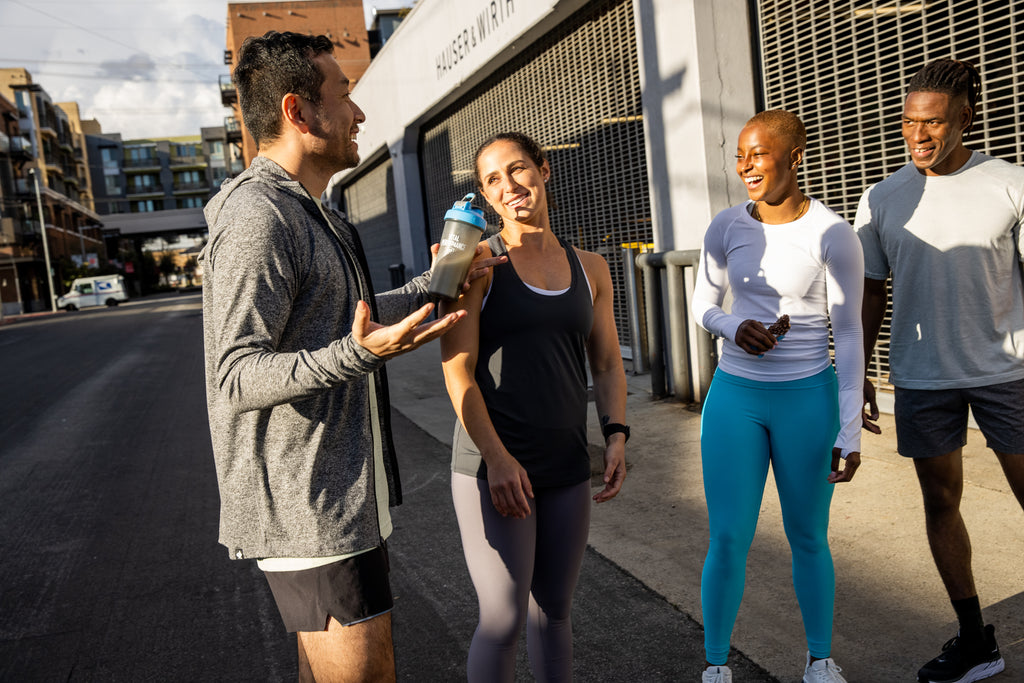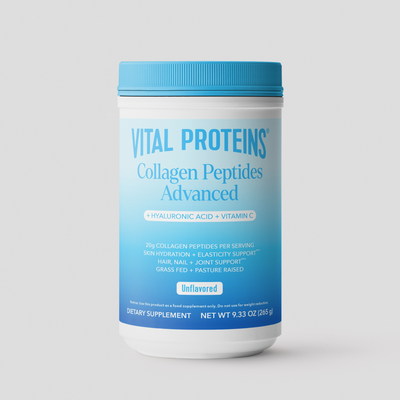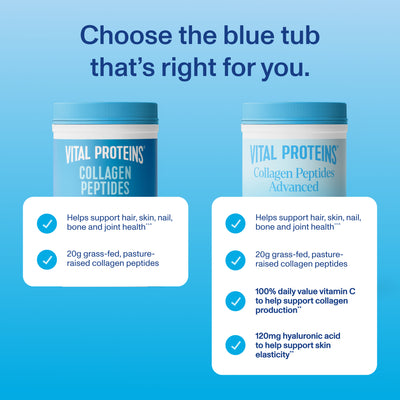Historically, collagen has been considered a “beauty-from-within” ingredient; however it has also been linked to a variety of other benefits, specifically those synonymous with athletic performance. Along with boosting a youthful appearance**, and promoting hair and nail health**, it can also support healthy bones, tendons, ligaments and joints.**
We tapped our in-house Registered Dietitian and Performance Education Lead Tom Smurr, RD, to share how to fuel every workout with Vital Performance™ and where exactly collagen comes in.
First, we’ll share what you need to know about collagen and your workouts, then break down how you can think about fueling before, during and after workouts. Remember: at the end of the day individualization is key. What works for you and your goals may not work for someone else, so be sure to listen to your body.

Consider Your Goals
No matter how you like to get active, one of your goals is probably to keep moving. Having strong bones, ligaments and tendons will allow you to do that.
Collagen supplementation can help keep people moving**, whether your activity of choice is rec league basketball, HIIT workouts, or running. That’s because collagen consumption can help support joint comfort during exercise.** The best time to take collagen? One that fits with your nutritional and exercise goals. Keep reading to find out more!
Support Your Movement
When you fuel post-workout, you probably focus on your muscle health. But the health of your joints, ligaments and tendons is just as important. Including collagen peptides in your post-workout fuel can help to target the protein turnover and renewal of the connective tissue proteins and have been shown to be beneficial to athletes returning to play.**
But collagen isn’t the only thing you should think about when fueling. You also have to support the type of workout you’re doing and the length and intensity of your workout.

Pre-Workout Fuel
Before a workout, your focus should be on what you need to eat to sustain your energy levels. Typically, Smurr recommends fueling one to two hours before a workout to avoid gastrointestinal (GI) upset.
For maximum energy to sustain throughout your workout, include simple, easy-to-digest carbohydrates that are low in fiber (to avoid GI upset). You’ll also want to eat a bit of protein to help fuel you and ease post-exercise muscle soreness, and a small amount of fat for long-term energy needs. To enhance energy, add caffeine such as coffee or tea. And always aim for proper hydration.
The American Council on Exercise (ACE) suggests drinking 17 to 20 oz. of fluid about two to three hours before a workout, seven to 10 ounces for every 10 to 20 minutes during exercise, and post-workout replenishing with 16 to 24 oz. of fluid per pound lost. (It’s also important to check in with your doctor before changing your diet for your performance.)
Here’s an example of what that looks like as a meal. At least two hours before exercise, drink at least 16 oz of water. Then, 45-60 minutes before eat a small meal of oatmeal with honey and almonds or avocado toast with an egg. Add Vital Proteins® Collagen Peptides to your coffee.
Smurr says: “About 30 minutes prior to my run, I’ll add in a medium banana and my morning supplements to help me power through the extra miles.”
Finding the meal that works best for you to fuel with pre-workout may take some practice, so don’t get discouraged. It will also vary depending on the type of workout you’re doing. Think: a long run or a heavy lifting day. Smurr also suggests keep track of what works and what doesn’t so you can stick to the plan that works for you.

Mid-Workout Fuel
This is where your fuel will vary most based on activity. If you’re a runner, you know that your longer runs will require mid-run fuel to avoid hitting that dreaded wall. If you’re doing a shorter run, focusing on strength, or completing a HIIT workout, mid-workout fuel might not be required and instead hydration should be your focus.
If you’re working out for less than 60 minutes, the typical rule of thumb is to focus on hydrating with water or a low or no-calorie electrolyte drink. You should begin hydrating within the first 15 minutes of activity by drinking small amounts of water. Pay attention to your environment, and adjust your hydration accordingly for factors including heat level, humidity and personal sweat level.
However, if your workout is longer than 60 minutes (a long run or ride) you’ll want to aim for at least 30g of carbs per hour to fuel your endurance exercise.
Here’s an example of what that looks like. After 30 minutes of exercise, sip on water with one stick pack of Hydration**+Collagen as needed. After 60 minutes, fuel with a quick carb such as a banana or dates. If you’re doing a really long run or ride a classic peanut butter and jelly sandwich makes great fuel.
Smurr Says: “I stash 1-2 dates with me to provide a quick carb and energy boost during my run. I also prep a water bottle with 12-16 oz of water and one Hydration** + Collagen packet in order to avoid that mid-run crash.”

Post-Workout Fuel
Your post-workout routine should include nutrition to help replace fuel utilized by muscles during training and restoring fluid and electrolytes lost through sweat (and a good stretching regimen). You’ll want to eat at least 20 to 30 grams of protein (like milk protein isolate) to aid in repair of damaged muscle tissue and to stimulate muscle protein synthesis, explains Smurr. And remember what we said about collagen peptides supporting bone and joint health**? Our Vital Performance™ Protein contains a 25g blend of milk protein isolate (including 10g of collagen peptides), to support improved recovery, stimulate muscle protein synthesis and promote healthy bones, joints and tendons.**
Here’s an example of what this looks like. Refuel with a smoothie made with Vital Performance™ Protein, or grab a Vital Performance™ Protein Bar if you’re on the go. And don’t forget your water!
Vital Tip: Proper sleep will help with your workout recovery too. Try our Sleep Gummies to help you slip into better sleep and wake feeling rested** so you’re ready to tackle your next workout.
Smurr Says: “I like to refuel with a smoothie filled with complex carbohydrates, healthy fats and protein. I end my day with a few supplements to help keep me healthy and support my overall wellness. I love adding in our new Vital Proteins® Wellness Gummies to my evening routine.”
Vital Note: This article has been made available for informational and educational purposes only. It is not intended to be a substitute for professional medical advice, diagnosis, or treatment. Always seek the advice of your physician or another qualified health provider with any questions you may have regarding a medical condition. Your licensed healthcare professional can best provide you with the diagnosis and treatment of any medical condition and assist you as well in deciding whether a dietary supplement will be a helpful addition to your regimen.

















